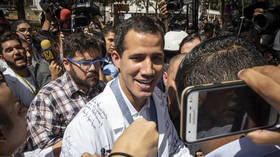Russian court jails Danish Jehovah’s Witness for 6 years in first case of its kind
Danish Jehovah’s Witness Dennis Christensen has become the first member of the religious group to be jailed for extremist offences in Russia. The group has been banned in the country since 2017.
A district court in Oryol, some 320km south of Moscow, sentenced Christensen to six years in prison after finding that he was the “de facto leader” of a local branch of Jehovah’s Witnesses, and had been responsible for organizing its activities.
Christensen, a 46-year-old construction worker and son of a Jehovah Witness missionary, had been living in Russia since 2000. He and his wife Irina were preaching for years, although Christensen was not officially a member of the group, the court heard.
He pleaded not guilty, claiming that he had been merely practicing his religion, in accordance with the Russian constitution. Before the verdict was announced, he shouted, calling for religious freedom to be protected in Russia.
Also on rt.com Justice Ministry officially lists Jehovah’s Witnesses as banned group in RussiaYaroslav Sivulsky, a spokesperson for the Jehovah’s Witnesses, told Reuters that they consider the verdict to be unjust.
In 2017, Russia’s Supreme Court declared the Jehovah’s Witnesses an “extremist organization,” and ordered all of its 395 regional branches to be disbanded. All of the group’s property was handed over to the state.
The conflict between Russian authorities and the religious group had been brewing since at least 2004. The national health authorities objected to the group’s strict rule prohibiting blood transfusions, especially in cases involving children.
The Jehovah’s Witnesses argued that the Russian law on extremism does not mention blood transfusion in any way, but the court rejected its defense. Since then, more than 100 criminal cases against the organization’s members have been opened and dozens of printed booklets have been put on a list of banned extremist literature.
However, last December, Russian President Vladimir Putin said during his annual media Q&A session that branding the Jehovah’s Witnesses as extremists is “utter nonsense,” and promised to look into the prosecution of the group’s members.
Like this story? Share it with a friend!














